高中英语必修二unit5_music_阅读教案
人教版高中英语必修二unit5 musicwarming up and reading教案
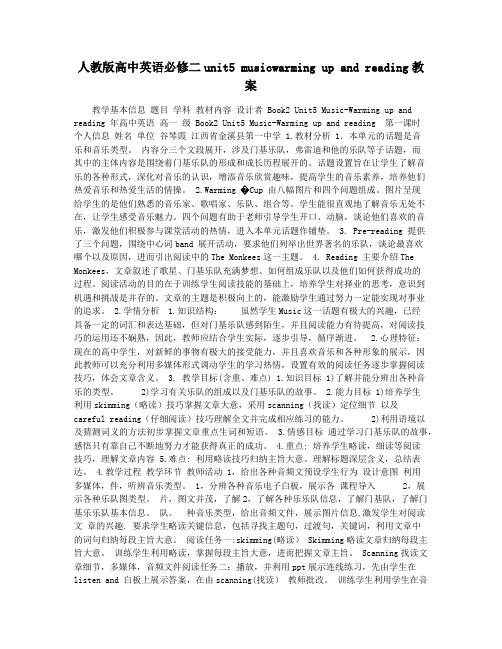
人教版高中英语必修二unit5 musicwarming up and reading教案教学基本信息题目学科教材内容设计者 Book2 Unit5 Music-Warming up and reading 年高中英语高一级 Book2 Unit5 Music-Warming up and reading 第一课时个人信息姓名单位谷琴霞江西省金溪县第一中学 1.教材分析 1.本单元的话题是音乐和音乐类型。
内容分三个文段展开,涉及门基乐队,弗雷迪和他的乐队等子话题,而其中的主体内容是围绕着门基乐队的形成和成长历程展开的。
话题设置旨在让学生了解音乐的各种形式,深化对音乐的认识,增添音乐欣赏趣味,提高学生的音乐素养,培养他们热爱音乐和热爱生活的情操。
2.Warming �Cup 由八幅图片和四个问题组成。
图片呈现给学生的是他们熟悉的音乐家、歌唱家、乐队、组合等。
学生能很直观地了解音乐无处不在,让学生感受音乐魅力。
四个问题有助于老师引导学生开口、动脑,谈论他们喜欢的音乐,激发他们积极参与课堂活动的热情,进入本单元话题作铺垫。
3. Pre-reading 提供了三个问题,围绕中心词band 展开活动,要求他们列举出世界著名的乐队,谈论最喜欢哪个以及原因,进而引出阅读中的The Monkees这一主题。
4. Reading 主要介绍The Monkees,文章叙述了歌星、门基乐队充满梦想、如何组成乐队以及他们如何获得成功的过程。
阅读活动的目的在于训练学生阅读技能的基础上,培养学生对择业的思考,意识到机遇和挑战是并存的。
文章的主题是积极向上的,能激励学生通过努力一定能实现对事业的追求。
2.学情分析 1.知识结构:虽然学生Music这一话题有极大的兴趣,已经具备一定的词汇和表达基础,但对门基乐队感到陌生,并且阅读能力有待提高,对阅读技巧的运用还不娴熟,因此,教师应结合学生实际,逐步引导,循序渐进。
2.心理特征:现在的高中学生,对新鲜的事物有极大的接受能力,并且喜欢音乐和各种形象的展示,因此教师可以充分利用多媒体形式调动学生的学习热情,设置有效的阅读任务逐步掌握阅读技巧,体会文章含义。
高中英语人教版必修2Unit 5 Music教学设计
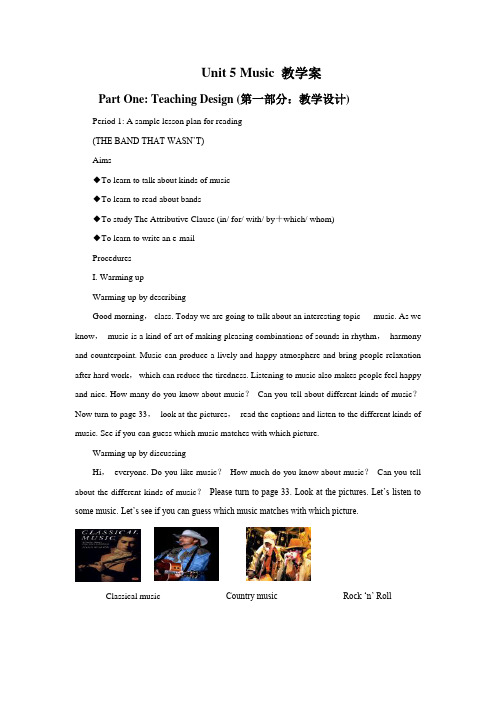
Unit 5 Music 教学案Part One: Teaching Design (第一部分:教学设计)Period 1: A sample lesson plan for reading(THE BAND THAT WASN’T)Aims◆To learn to talk about kinds of music◆To learn to read about bands◆To study The Attributive Clause (in/ for/ with/ by+which/ whom)◆To learn to write an e-mailProceduresI. Warming upWarming up by describingGood morning,class. Today we are going to talk about an interesting topic --- music. As we know,music is a kind of art of making pleasing combinations of sounds in rhythm,harmony and counterpoint. Music can produce a lively and happy atmosphere and bring people relaxation after hard work,which can reduce the tiredness. Listening to music also makes people feel happy and nice. How many do you know about music?Can you tell about different kinds of music?Now turn to page 33,look at the pictures,read the captions and listen to the different kinds of music. See if you can guess which music matches with which picture.Warming up by discussingHi,everyone. Do you like music?How much do you know about music?Can you tell about the different kinds of music?Please turn to page 33. Look at the pictures. Let’s listen to some music. Let’s see if you can guess which music matches with which picture.Classical music Country music Rock ‘n’ RollRap Orchestra Folk music 、Yes,you are right. I’m sure you will really enjoy yourselves after listening to all these beautiful music. What kind of music do you like better,Chinese or Western,classical or modern?Why?How does music make you feel?Why do you like to listen to music?Let’s discuss these questions in small groups. Try to share your opinions with one another.II. Pre-reading1.Thinking and sayingHave you heard about any of the famous bands in the world?List some if you can.For referen ce: I’ve heard about “The Beatles”,“Back Street Boys”,“The Eagles”,“West life” and “Pink Floyd”.2.Listening,talking and sharingLet’s listen to some pieces of music from different bands. Work in groups of four. Tell your group mates which band you like best. Why?Then the group leader is to stand up and share the group idea with the class.For reference: I am from Group 1. Our group likes “The Beatles” best. We like their style of performances. Listening to their performances,we will feel relaxed,amused,and their performances make us think a lot about life.Do you know anything about “The Monkees”?For referenc e: “The Monkees” is a band that was first popular in the 1960s in America.Unlike most bands of the time,the Monkees were not formed by its members but rather by TV producers. They were a fictional band in the TV show of the same name. The band was composed of Mike Nesmith,Mickey Dolenz,Davy Jones,and Peter Tork. All themembers had some musical experience. Let’s come to the reading --- The Band That Wasn’t and find more about them.III. Reading1.Reading aloud to the recordingNow please listen a nd read aloud to the recording of the text THE BAND THAT WASN’T. Pay attention to the pronunciation of each word and the pauses within each sentence. I will play the tape twice and you shall read aloud twice,too.2.Reading and underliningNext you are to read and underline all the useful expressions or collocations in the passage. Copy them to your notebook after class as homework.Collocations from THE BAND THAT WASN’Tdream of doing ,at a concert ,with sb. clapping and enjoying …,sing karaoke ,be honest with oneself,get to form a band,high school students,practice one’s music,play to passers-by,in the subway,earn some extra money,begin as a TV show,play jokes on…,be based loosely on…,the TV organizers,make good music,put an advertisement in a newspaper,look for rock musicians,pretend to do sth.,the attractive performances,be copied by…,support them fiercely,become more serious about…,play their own instruments,produce one’s own records,start touring,break up,in the mid-1980s,a celebration of one’s time as a real band3.Reading to identify the topic sentence of each paragraphSkim the text and identify the topic sentence of each paragraph. You may find it either at the beginning,the middle or the end of the paragraph.1st paragraph: How do people get to form a band?2nd paragraph: Most musicians meet and form a band.3rd paragraph: One band started as a TV show.4th paragraph: “The Monkees” became even more popular than “The Beatles”.3.Reading and transferring informationRead the text again to complete the tables,which list how people formed a band and how The Monkees was formed by the TV organizers and became a real band.How do people get to form a band ? MembersHigh school studentsReasonsThey like to write and play music. PlacesThey practice their music in someone’s home. FormsThey may play to passers-by in the street or subway. Results They can earn some extra money. They may also have a chance todream of becoming famous.How was The Monkees formed and became a real band ?The Monkees in 1968 (left to right): Micky Dolenz ,Peter Tork , Mike Nesmith & Davy Jonesbeginningof thebandIt began as a TV show. styleof the performanceThey played jokes on each other as well as played music. firstmusic and jokesMost of them were based loosely on the band called “The Beatles”. development of theband They became more serious about their work and started to play their own instruments and write their own songs like a realband. They produced their own records and started touring andplaying their own music.changes of the band The band broke up in about 1970, but reunited in themid-1980s. They produced a new record in 1996, which was acelebration of their time as a real band.4. Reading and understanding difficult sentencesAs you have read the text times,you can surely tell which sentences are difficult to understand. Now put your questions concerning the difficult points to me.IV. Closing downClosing down by doing exercisesTo end the lesson you are to do the comprehending exercises No. 1,2,3 and 4.Closing down by having a discussionDo you think the TV organizer s were right to call “The Monkees” a band when they did not sing or write their own songs?Why?For reference: I don’t think the TV organizers were right to call “The Monkees” a band when they did not sing or write their own songs because singing and writing its own songs was the basis of a band.Do you agree that the jokes were more important than the music for this band?Give a reason.For reference: Yes. I think it is the jokes that really attract more fans.No. I think the purpose of forming a band is getting people to enjoy the spirit of music.It’s more important than playing jokes just to make people laugh.Closing down by retelling the form of the band The Monkees.I shall write some key words and expressions on the board. You are to retell the form of the band according to these words.For reference: begin as a TV show,the TV organizers,look for,put an advertisement in a newspaper,use actors for the other members of the band,pretend to singPeriod 2: A sample lesson plan for Learning about Language(The Attributive Clause (in/ for/ with/ by+which/ whom).AimsTo help students learn about the Attributive Clause with a preposition in front.To help students discover and learn to use some useful words and expressions.To help students discover and learn to use some useful structures.ProceduresI. Warming upWarming up by discovering useful words and expressionsTurn to page 35 and do exercises No. 1,2 and 3 first. Check your answers against your classmates’.II. Learning about grammar1.Reading and thinkingTurn to page 34 and r ead with me the text of THE BAND THAT WASN’t. As you read on,pay attention to The Attributive Clause (in/ for/ with/ by+which/ whom),that is,the attributive clauses with a preposition ahead of the relative pronoun shown in the sentences.For reference: The musicians of whom the band was formed played jokes on each other as well as played music. However,after a year or so in which they became more serious about their work,“The Monkees” started to play their own ins truments and write their own songs like a real band.2.Doing exercises No. 1 and 2 on page 35Turn to page 34. Look at the two sentences:The musicians of whom the band was formed played jokes on each other as well as played music.However,after a year or so in which they became more serious about their work,“The Monkees” started to play their own instruments and write their own songs like a real band.Pay attention to the structure: preposition + relative pronoun. Usually only two relative pronouns --- which and whom--- can be used in the Attributive Clause,with a preposition put before the clause. That can’t be used. Look at the screen. Here are more examples on this kind of structure.1.This is the reason for which he left his hometown. (=why)2.I’ll never forget the day on which we stayed together. (=when)3.This is the girl from whom I learned the news.4.The person to whom I spoke just now is the manager that I told you about.5.I’ll show y ou a store in which you may buy all that you need.(=where)6.I don’t like the way in which you laughed at her.(=that)Now go on to do Exercise No. 2 on page 36,that is,to sort out the sentences.III. Ready used materials for The Attributive Clause (in/ for/ with/ by+which/ whom)In formal styles we often put a preposition before the relative pronouns which and whom: ∙The rate at which a material heats up depends on its chemical composition.∙In the novel by Peters,on which the film is based,the main character is a teenager.∙An actor with whom Gelson had previously worked contacted him about the role.∙Her many friends,among whom I like to be considered,gave her encouragement.Notice that after a preposition you can’t use who in place of whom,and you can’t use that or zero relative pronoun either:∙Is it right that politicians should make important decisions without consulting the public to whom they are accountable?(not --- the public to who they are accountable.) ∙The valley in which the town lies is heavily polluted. (not --- The valley in that the town...) ∙Arnold tried to gauge the speed at which they were traveling. (not --- the speed at they were traveling.)In informal English we usually put the preposition at the end in attributive clauses rather than at the beginning:∙The office which Graham led the way to was filled with books.∙Jim’s footballing ability,which he was noted for,had been encouraged by his parents.∙The playground wasn’t used by those children who it was built for.In this case we prefer who rather than whom (although whom is used in formal contexts). In restrictive attributive clauses we can also use that or zero relative pronoun instead of who or which (e.g. ...the children (that) it was built for).If the verb in attributive clauses is a two-or-three-word verb (e.g. come across,fill in,go through,look after,look up to,put up with,take on) we don’t usually put the preposition at the beginning:∙Your essay is on e of those (which/that) I’ll go through tomorrow. (rather than...throughwhich I’ll go tomorrow.)∙She is one of the few people (who/that) I look up to. (not ... to whom I look up.)In formal written English,we often prefer to use of which rather than whose to talk about things:∙A huge amount of oil was spilled,the effects of which are still being felt. (or...whose effects are still being felt.)∙The end of the war,the anniversary of which is on the 16th of November,will be commemorated in cities throughout the country. (or...whose anniversary is on...) Note that we c an’t u se of which in place of whose in the patterns described in Unit 71B:∙Dorothy was able to switch between German,Polish and Russian,all of which she spoke fluently. (not..,all whose she spoke...)We can sometimes use that...of in place of of which. This is less formal than of which and whose,and is mainly used in spoken English:∙The school that she is head of is closing down. (or The school of which she is head...)Whose can come after a preposition in attributive clauses. However,it is more natural to put the preposition at the end in less formal contexts and in spoken English:∙We were grateful to Mr. Marks,in whose car we had traveled home. (or...whose car we had traveled home in.)∙I now turn to Freud,from whose work the following quotation is taken. (or...whose work the following quotation is taken from.)IV. Closing down by doing exercises:Join the sentence halves using which or whom after an appropriate preposition. (A)a. I would never have finished the work.b. It was primarily written.c. We know nothing.d. They got a good view.e. He learned how to play chess.f. Dennis scored three goals in the final.g. She was born.h. It was discovered.1.They climbed up to the top of a large rock.2. I would like to thank my tutor.3. She has now moved back to the house on Long Island.4. The star is to be named after Patrick Jenks.S. This is the ball.6. He is now able to beat his father.7. The book is enjoyed by adults as well as children.8. There are still many things in our solar system.Key for reference:1.They climbed up to the top of a large rock,from which they got a good view.2. I would like to thank my tutor,without whom I would never have finished the work.3. She has now moved back to the house on Long Island,in which she was born.4. The star is to be named after Patrick Jenks,by whom it was discovered.S. This is the ball. Dennis scored three goals in the final.6. He is now able to beat his father,from whom he learned how to play chess.7. The book is enjoyed by adults as well as children,about whom it was primarilywritten.8. There are still many things in our solar system,about which we know nothing.Are these correct or appropriate?If they are,put a√. If they are not,give a reason,correct them and give alternatives if you can. (A)I. It's a piece of jewelry across which I came in an antique shop. --- which I came across in an antique shop. (‘came across’ is a two-word verb.)2. The extra work which she took on was starting to affect her health.3. My mother,after whom I looked for over 20 years,died last year.4. The people whom I work with are all very friendly.5. Some of the criticisms with which they had to put up were very unfair.6. He had many friends with whom he had a regular correspondence.7. The woman to who he is engaged comes from Poland.8. The forms which I had to fill in were very complicated.Rewrite these sentences so that they are more appropriate for formal written English. Usepreposition + which or preposition + whose,as appropriate. (B)I. Tom Sims,whose car the weapons were found in,has been arrested. Torn Sims,in whose car the weapons were found,has been arrested.2. Tom Ham,whose novel the TV series is based on,will appear in the first episode.3. Dr Jackson owns the castle whose grounds the main road passes through.4. Tessa Parsons is now managing director of Simons,the company that she was once a secretary in.5. Allowing the weapons to be sold is an action that the Government should be ashamed of.6. The dragonfly is an insect that we know very little of.Period 3: A sample lesson plan for Using LanguageAimsTo read the s tory about Freddy and then enjoy and understand Beatles’ songs.To use the language by reading,listening,speaking and writing.ProceduresI. Warming up by listening and writingTurn to page 37 and read these sentences before listening to the tape. Then listen to the tape and decide true or false.II. Guided reading1. Reading and translatingRead more about F reddy’s life and translate it into Chinese paragraph by paragraph.2. Reading and underliningNext you are to read and underline all the useful expressions or collocations in the passage. Copy them to your notebook after class as homework.Collocations from Freddy’s lifebecome famous,visit Britain on a tour,wait for hours to get tickets for the concerts,be confident,enjoy singing and all the congratulations,the most exciting experience,sing in a TV program called “Top of the Pops,wear an expensive suit,give a performance to a TV camera,go wrong,not go out without being followed everywhere,wear sunglasses,hide in railway stations,one’s personal life,become too painful for sb.,pack one’ s bags3. Doing exercisesNow you are going to do exercises No. 3,4 and 5 on page 38 following the article.Ex3: Here are the incorrect sentences which should be crossed out.1. Freddy and his band always loved being pop stars.2. His favorite program was “Top of the Pops”.3. Things went wrong because Freddy and his band hid themselves.4. They realized they had to go because they were painful.Exercise 4 Answer these questions:1. This is an open question by which students are asked about their opinions.Answers may vary.2. Answers may vary but there is information in the reading passage that may include:--- becoming rich;--- doing a job you want to do;--- having many fans;--- people enjoying your music.3. Answers may vary but information may include:--- peaceful and quiet;--- a private life away from crowds;--- a personal life which others do not discuss.Exercise 5: The main idea is No. 3. This is a story about a band that became famous and did not like it. Only No. 3 best summarizes the main idea,while all the others reflect just part of the main idea. At first,Freddy and his band wanted to be famous,but when he became famous,they were always being followed wherever they went,which they found painful.III. Guided writing1.Writing a letter for advicePlease turn to page 38 writing. Let’s read the instructions.You and your friends want to start your own band. However,you have never played ina band before. You write an e-mail to Freddy for his advice. The e-mail is started for you,but you have to finish it.You’d bett er do some brainstorming in small groups before writing your letters. You should follow the procedure for brainstorming and outlining introduced in Module 1 Unit 2.Writing tips:1. In groups discuss some questions you would like to ask Freddy.2. Make a list of them and choose the best questions.3. Share your ideas with another pair;discuss all questions and then decide whichones you want to ask Freddy.4. Use each question to start a new paragraph.5. Write your question first;then add extra information to show Freddy why youneed help.6. Finish the letter politely and thank Freddy for his help.2.Reading Freddy’s replyLet’s read Freddy’s reply and answer the questions:--- How was Freddy’s band formed?--- What advice does Freddy give?3.Writing a note and a paragraphPlease turn to page 74. Now in pairs you are going to decide on the best way to tell a foreign friend about one kind of Chinese folk music. What do you think they need to know before they can enjoy it?Why do you like it?Who are your favorite singers?Discuss it with your partner and write notes to remind you of your most important ideas. Then write a paragraph telling your foreign friend about the type of Chinese folk music you have chosen. Use a dictionary and other reference books to help you.IV. Further applyingFinding informationGo to the library to read or get online to search in order to find more information on music and musicians. Take notes of your findings and report them to your group mates next Monday morning.V. Closing down by filling a formMake use of the text and others to fill in the form below.How do people form a bandMembersReasonsPlacesFormsResultsClosing down by describing a bandTo end this period,I am going to have two of you to describe to the class a band whom you appreciates. Who’d like to speak first?Part Two: Teaching Resources (第二部分:教学资源)Section 1: A text structure analysis of THE BAND THAT WASN’TI. Type of writing and summary of the ideaType of writing This is a piece of narrative writing.Main idea of the passage The band The Monkees was formed in quite adifferent way. It started as a TV show,with musiciansplayed jokes on each other as well as played music,based loosely on the band called The Beatles. As timewent on,their attractive performances gained fiercelysupport from their fans. With their own particular style ofperforming their band at last became very popular in theUSA.Topic sentence of 1st paragraphHave you ever wanted to be a famous singer or musician?Topic sentence of 2nd paragraphMost musicians meet and form a band because they like to play music.Topic sentence of 3rd paragraphHowever,there was one band that started in a different way.Top sentence of 4th paragraphTheir attractive performances were copied by other groups and their fans supported them fiercely.II. A tree diagramIII. A retold passage of the text1. A possible version:Being a famous singer or musician may be the dream of many people. Becoming a member of a band may help you realize the dream. But just how can people form a band ?Most musicians often meet and form a band for they are congenial with each other. High school students may also form a band to practice music together or sometimes play in the street to passers-by to earn some extra money , which is also a chance to realize their dreams of becoming famous.However , There was a band which was started in quite a different way. The musicians of whom the band was formed played jokes on each other and played music , loosely based on the Beatles. Their exciting performances were copied by other groups and were fiercely supported by their fans. That band was The Monkees. After a year or so , The Monkees became more serious of their work , playing their own instruments and writing their own music. Though it broke up in 1970, it reunited in the mid-1980s and is still popular today.Section 2: Background information on music , musicians and the band The MonkeesI. Different types of music:Folk music Dreaming of being a famous musician or singer.How musicians form bands. How The Monkees got their start. How The Monkees became serious about the music business.It has been passed down from one generation to another. At first it was never written down. People learned the songs from their families,relatives,neighbors and friends in the same village. These songs were about the country life,the seasons,animals and plants,and about love and sadness in people’s lives.Pop musicIt is a kind of modern music with a strong beat and not of lasting interest,especially just favored for a short time by younger people•Rock ’n’ RollIt is also called rock and roll,a kind of modern music with strong beat,played loudly on electrical instruments,in which the singer repeats the same few simple words.JazzJazz was born in the USA around 1890. It came from work songs sung by black people and had its roots in Africa. Jazz started developing in the 1920s in the southern states. Soon it was played by white musicians,too,and reached other parts of the USA.African musicIt plays an impor tant part in people’s lives,especially for work,and at festivals and weddings,when people dance all night long.Indian musicIt’s not written down. There is a basic pattern of notes which the musician follows. But a lot of modern music is also written. India also produces films with music,and millions of records are sold every year.Music in the CaribbeanThe slaves who were brought from Africa developed their own kind of music. West Indians make musical instruments out of large oil cans. They hit different parts of the drum with hammers to produce different notes. This type of music has become very famous in Britain and is very good music to dance to.II. Famous musicians:Joseph Haydn(1732-1809)was an Austr ian composer and is known as “the father of the symphony”. Other composers had written symphonies before Haydn,but he changed the symphony into a long piece for a large orchestra.He was born in a village in Austria,the son of a peasant. He had a beautiful singing voice. After studying music in Vienna,Haydn went to work at the court of a prince in eastern Austria,where he became director of music. Having worked there for 30 years,Haydn moved to London,where he was very successful.Wolfgang Amadeus Mozart (1756-1791)was a composer,possibly the greatest musical genius of all time. He only lived 35 years and he composed more than 600 pieces of music.Mozart was born in Salzburg,Austria. His father Leopold was a musician and orchestra conductor. Wolfgang had musical talent from a very early age. He learned to play the harpsichord in a concert for the Empress of Austria.By the time he was 14,Mozart had composed many pieces for the harpsichord,piano and violin,as well as for orchestras. While he was still a teenager,Mozart was already a big star and toured Europe giving concerts. Haydn met Mozart in 1781 and was very impressed with him. “He is the greatest composer the world has known,” he said. The two were friends until Mozart’s death in 1791.Ludwig van Beethoven (1770-1827)was born in Bonn,Germany. He showed musical talent when he was very young,and learned to play the violin and piano from his father,who was a singer. Mozart met Beethoven and was impressed by him. “He will give something wonde rful to the world,” he said. Beethoven met Haydn in 1791,but was not impressed by the older man. After they had known each other for many years,Beethoven said,“He is a good composer,but he has taught me nothing.” However,it was Haydn who encouraged Beethoven to move to Vienna. Beethoven became very popular in the Austrian capital and stayed there for the rest of his life. As he grew older,he began to go deaf. He became completely deaf during the last years of his life,but he continued composing.III. Musical instrument 乐器saxophone electrical equipment pianoguitar fluteV. What are the functions of music ?•Make things more lively and interesting•Make things better for pe ople to understand and enjoy•Express people’s feeling•Make people feel good•Help people forget their pain•Attract people’s attention•help people to remember things wellVI. The introduction of the band The MonkeesThe Monkees were a four-person band who appeared in an American television series of the same name , which ran on NBC from 1966 to 1968. The Monkees were formed in 1965 in LosAngeles,California and disbanded in 1970. At their peak they were one of the most popular musical acts of their time.Several reunions of the original lineup have taken place. The first reunion lasted from 1986 to 1989,and a second regrouping took place between 1996-1997. The Monkees last worked together for a brief period in 2001.Section 3: Words and expressions from Unit 5 THE BAND THAT WASN’TI. Words for Readingclassicaladj. (of music)put together and arranged(composed) with serious artistic intentions;having an attraction that lasts over a long period of time(as opposed to popular or folk music)(音乐)古典的Bach and Beethoven wrote classical music. the classical music of India/ the classical symphonyrollvt.&vi. 1. to (cause to) move along by turning over and over(使)滚动We rolled the barrels of oil onto the ship. Tears were rolling down her cheeks. 2. to move steadily and smoothly along(as) on wheels(车轮)滚动;转动The train rolled slowly into the station. The waves rolled over the sand. 3. (of a ship)to swing from side to side with the movement of the waves摇摆;摇晃The ship rolled so heavily that we were all sick.4. keep the ball rolling: to keep things active and moving(使事情,工作等)继续进行下去;不松懈5. set the ball rolling: to be the first to do something,hoping that others will follow带动;带头(希望他人跟随)I’ll sing a song first,just to set the ball rolling.folkadj. of,connected with,or being music or any other art that has grown up among working and/or country people as an important part of their way of living and belongs to a particular area,trade,etc.,or that has been made in modern times as a copy of this(音乐;艺术)民间的;民俗的folk music/ folk songs/ Chinese folk art/ give a folk concert/a folk singerjazz n.爵士音乐traditional jazz/ modern jazz/ jazz music/ a jazz bandmusician n.音乐家a fine musiciandreamn. 1. a group of thoughts,images,or feelings experienced during sleep梦2. sth. imaged,。
必修二第五单元music教案

必修二第五单元music教案1.教学目标:1.1知识与技能:学生能听懂并使用表示音乐的词汇;能较准确地描述音乐类型和文化背景;能就音乐审美主张表达个人观点。
1.2过程与方法:采用启发式教学法,引导学生自主思考;采用听、说、读、写、演等多种教学方法进行教学;通过讨论、演示等方式加深学生对音乐的理解。
1.3情感态度价值观:培养学生对音乐的热爱、感受音乐的美感;引导学生客观、理性地审美,培养学生应该有自己的审美观。
2.教学重点难点2.1掌握有关音乐类型和文化背景的表达方法,学会语言交际。
2.2提高学生的跨文化交际能力。
3.教学过程3.1暖身环节引入下文主题,可以与学生分享一首他们喜欢的音乐,介绍歌曲类型、文化背景和演唱者等。
3.2输入环节通过展示视频和图片等方式来主题音乐的类型和背景等(例如摇滚乐、传统音乐、爵士乐等等),学生通过观看背景图和听取音乐鉴别不同的音乐类型。
然后与学生讨论各种类型音乐和文化背景的关系,并竣工讨论。
3.3实践与运用进行一个小组作业,让学生组成3-4人的小组,选择一个音乐类型并作一份10分钟的介绍PPT。
输出点:档次的文件,图片和美术创意等。
这样,学生可以进一步分析和交流有关音乐类型和文化背景方面的细节,培养同伴间的合作与学习对话能力。
3.4综合评价在教学的最后,通过口头交流的方式,让学生跨组交流彼此的发现和体会。
对小组和个人表现进行评价和点评,以便针对学生的不同表现安排合适评分标准(例如,个人发言时间、贡献度、团队沟通交流等)。
4.教学评价4.1教学效果评价:通过测试和小练习考察学生对不同音乐类型和文化背景的理解掌握情况。
4.2教学过程评价:检视和总结教学过程中学生的参与度和互动情况,以提高今后的教学质量和效果。
4.3教学方法与手段评价:评估启发式教学法等多种教学方法和手段的使用情况,以便今后的教学设计和改进。
5.教学反思在这一单元教学过程中,尤其是在小组讨论环节,教师具体指导学生进行互动和讨论,以增加学生的积极性和参与度。
Unit 5 Music Reading and Thinking 教案人教版高中英语必修第二册
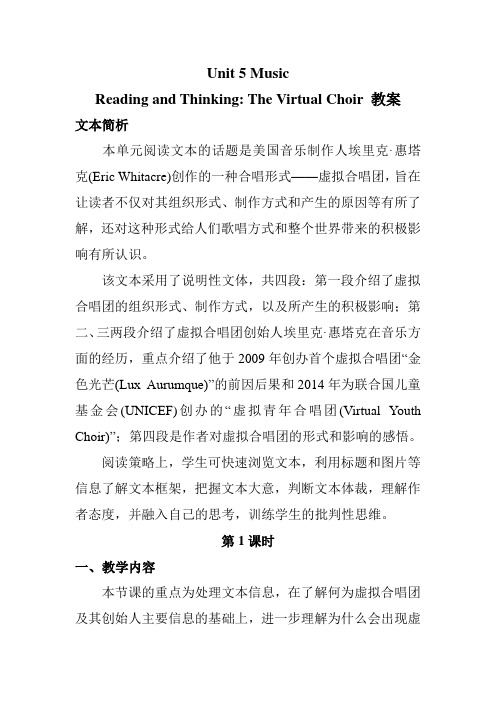
Unit 5 MusicReading and Thinking: The Virtual Choir 教案文本简析本单元阅读文本的话题是美国音乐制作人埃里克·惠塔克(Eric Whitacre)创作的一种合唱形式——虚拟合唱团,旨在让读者不仅对其组织形式、制作方式和产生的原因等有所了解,还对这种形式给人们歌唱方式和整个世界带来的积极影响有所认识。
该文本采用了说明性文体,共四段:第一段介绍了虚拟合唱团的组织形式、制作方式,以及所产生的积极影响;第二、三两段介绍了虚拟合唱团创始人埃里克·惠塔克在音乐方面的经历,重点介绍了他于2009年创办首个虚拟合唱团“金色光芒(Lux Aurumque)”的前因后果和2014年为联合国儿童基金会(UNICEF)创办的“虚拟青年合唱团(Virtual Youth Choir)”;第四段是作者对虚拟合唱团的形式和影响的感悟。
阅读策略上,学生可快速浏览文本,利用标题和图片等信息了解文本框架,把握文本大意,判断文本体裁,理解作者态度,并融入自己的思考,训练学生的批判性思维。
第1课时一、教学内容本节课的重点为处理文本信息,在了解何为虚拟合唱团及其创始人主要信息的基础上,进一步理解为什么会出现虚拟合唱团以及它的出现对人们和社会又产生了什么样的影响。
二、课时目标1. 通过整体阅读活动,获取虚拟合唱团及其创始人的基本信息,并梳理虚拟合唱团的发展历程及其给人类社会带来的正面影响。
2. 通过寻读、细读等阅读活动,总结虚拟合唱团的成因,并深入理解作者要传递的深层含义。
3. 通过梳理文本介绍虚拟合唱团的篇章布局,了解写作特点,为第二课时的仿写做好铺垫。
三、教学过程Activity 1:Activating background knowledge of the virtual choir本活动为实现课时目标1做铺垫。
1. Talk about what a choir is.Q1:What did you see in the video?Q2:What is a choir?2. Talk about whether people can sing together with hundreds of people while they are alone at home.Q:Could you imagine singing together with hundreds of people while you were at home alone?【设计意图】通过课前播放One V oice Children’s Choir的视频,创设情境,引出主题;引导学生根据自身经验给合唱团下定义;通过提问,激活学生背景知识,提升其阅读兴趣。
人教版高中英语必修二Unit 5《Music》(Reading)学案
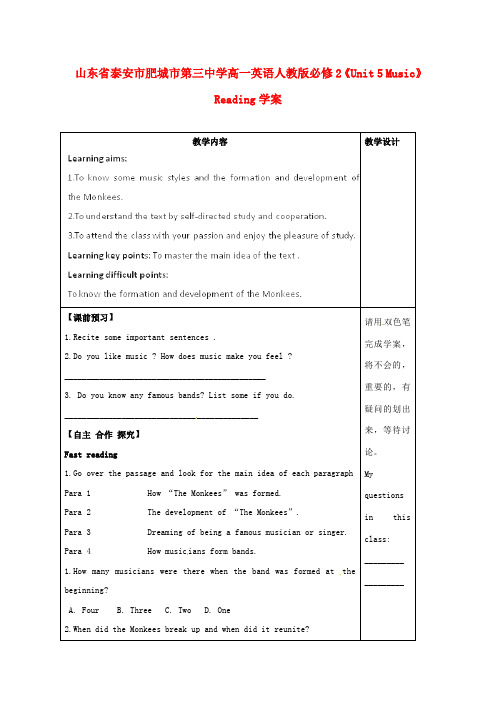
__________________________________________________________
Para. 3&4
How did the Monkees develop?
It began as a ______________.As some actors could not sing wel l, they had to ___________________ _____. So during the broadcast, they just_____________________.
_________
_________
_________
My answers after my researches:
_________
______
_________
The keys after discussions in my co—group:
___________
_________
1.How many musicians were there when the band was formed at the beginning?
A. Four B. Three C. Two D. One
2.When did the Monkees break up and when did it reunite?
______________________ ____________________________________
____________________________ _________________ _____________
必修二unit5-music-阅读教案
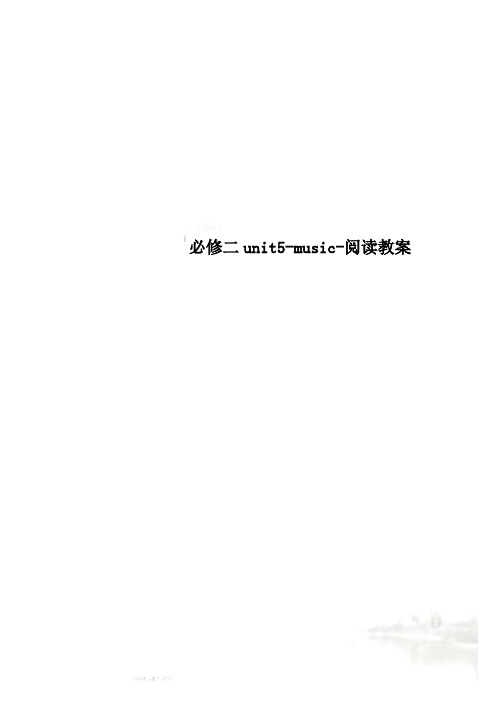
必修二unit5-music-阅读教案《人教版高中英语必修2》Unit5第一课时教学案例学情分析教学对象为高中一年级学生,智力发展趋于成熟。
他们的认知能力比初中阶段有了进一步的发展,渐渐形成用英语获取信息、处理信息、分析问题和解决问题的能力。
他们学习比较认真,求知欲旺盛,思维比较活跃,同时表现欲也很强。
部分学生的基础较好,能主动配合老师,愿意开口讲。
他们有着高中生独立、爱表现,张扬个性的特点。
因此,设置他们感兴趣的活动,就能让他们投入到课堂活动中来。
教学目(一)、知识和能力目标1.通过阅读课文和完成所给的任务,能使用本课重点的词汇对课文作出简单复述;2.能够说出世界音乐的种类;3.能够简单运用速读、跳读、精读阅读文章(二)、情感目标教学步骤一.Warming up(热身)——5minutes1. Attract students’ attentionPlay the song Knocking On Heaven’s Door about the “I am a singer”with students which quite famous during this time to attract students attention to the learning content, especially mention the kind of music “Rock ‘n’rolllead students to the textbook on page33.2.Show picturesShow students those pictures in the textbook音乐这个课题,这样可以引起他们对该单元内容的兴趣并可以自然而然地引入到课文阅读。
二.Pre-reading(读前)——8minutesTask one:Discussion and TalkingFour students in one group to discussionGive students some questions ask them to speak out 1.Do you know any famous bands? List some if you do.2.Which one do you like best? Why?3.Do you know anything about the Monkees?设计目的:把学生分小组讨论有利于学生的合作学习能力的提高,这些问题起到过渡作用,能够顺利地进入到接下去的阅读阶段。
2024秋季人教版高中英语必修第二册Unit5Music《5.Readingforwriting》

教学设计:2024秋季人教版高中英语必修第二册Unit 5 Music《5.Reading for Writing》一、教学目标(核心素养)1.语言能力:通过阅读相关音乐主题的文本,学生能够提取关键信息,学习并模仿文本中的语言结构和表达技巧,提升书面表达能力。
2.思维品质:培养学生批判性思维和创造性思维能力,通过分析和讨论文本内容,形成自己对音乐及其影响的独特见解。
3.学习能力:引导学生掌握“以读促写”的学习策略,通过阅读积累素材,学习写作技巧,提高自主学习能力。
4.文化意识:增强学生对音乐文化的理解和尊重,通过阅读和写作活动,拓宽国际视野,增进跨文化交流能力。
二、教学重点•学习并模仿文本中的语言结构和表达技巧,如描述性语言、对比手法等。
•提取文本中的关键信息,构建写作框架,为写作任务做准备。
三、教学难点•如何将阅读中获得的信息和技巧有效转化为自己的写作内容。
•如何在写作中灵活运用所学语言结构和表达技巧,使文章内容丰富、表达流畅。
四、教学资源•人教版高中英语必修第二册教材•相关音乐主题的阅读材料(如音乐评论、音乐家传记片段)•多媒体教学资源(如PPT、音频、视频片段)•写作指导手册或范例文章五、教学方法•阅读指导法:引导学生分析文本结构、语言特点和表达技巧。
•讨论交流法:组织小组讨论,分享阅读感受,激发写作灵感。
•模仿练习法:通过模仿文本中的语言结构和表达技巧进行写作练习。
•反馈评价法:教师及时给予学生写作反馈,指导学生改进不足之处。
六、教学过程1. 导入新课(5分钟)•音乐话题引入:播放一段具有代表性的音乐片段,引导学生讨论音乐在他们生活中的作用和意义,激发学生对音乐话题的兴趣。
•明确任务:介绍本节课的教学目标,即通过阅读相关音乐主题的文本,学习写作技巧,为接下来的写作任务做准备。
2. 新课教学(30分钟)•阅读文本(10分钟):•学生自主阅读提供的音乐主题文本,注意文本的语言结构、表达技巧和关键信息。
高中英语必修二Unit5_Music教案

Unit5 Music (一)[教学目标]:一、知识与技能1、掌握话题语言的运用、就熟悉的音乐话题表达看法;2、了解各种各样的音乐形式,深化对音乐的认识;3、学会从一般文字资料中获取主要信息、思考话题背后的更深层次的内容,学会深入发掘和探讨。
二、过程与方法1、听音乐,感受音乐风格;2、分组讨论、合作练习;3、结合所知,分类整理与归纳。
三、情感态度与价值观1、增添音乐欣赏趣味,提高音乐修养;2、懂得在日常交流中与他人分享各种学习资源、理解并尊重他人;3、培养合作精神和积极乐观的人生态度。
[教学重点]:1、掌握有关音乐的单词、熟练运用课文中所出现的重要词汇与短语2、学习由介词+which/whom引导的定语从句3、进一步熟悉有关建议与偏好的表达方式[教具准备]:多媒体、音乐文件[引入新课]:提出问题;同学们最喜爱的音乐类型是什么?理由?[讲解词]:音乐是我们日常生活中表达喜悦、忧伤、幸福、忧愁等诸多情感的媒介,也是大家十分喜爱的艺术形式,要让大家说出自己喜爱的歌手或者音乐家我相信大家一定可以说出好多来。
今天我想和同学们探讨一下,大家平时喜爱的音乐类型,对这些音乐类型的了解和体会,我也很想听听同学们对这些音乐类型的看法,给大家讲讲为什么喜欢这种音乐类型?(选若干同学们回答)(适当总结学生所讲)同学们对所喜爱的音乐类型理由的阐述也是各有道理,所谓萝卜白菜各有所爱,每个人都有自己独特的个人喜好,对音乐类型的偏好也是如此。
也许某一天你们之中有人会成为音乐家,或者有人会成立乐队,给大家带来好听的音乐作品,丰富大家的精神生活。
[讲授新课]:一、介绍门基乐队[提出问题]:同学们有没有听过门基乐队?门基乐队有哪些作品?[学生讨论]:对门基乐队的了解。
门基乐队是一只美国本土乐队,由四人组成,于二十世纪60年代兴起,最初,乐队成员是应一则电视广告走到一起的。
主要作品有《Waiting For The Sun》、《The Unknown Soldier》、《The Soft Parade》、《Morrison Hotel》[运用教具]:播放门基乐队的《I'm a believer》给学生听,使他们亲耳感受门基乐队的风格特点。
人教版高一英语必修二《Unit5 Music》说课稿

人教版高一英语必修二《Unit5 Music》说课稿一、教材背景《Unit5 Music》是人教版高一必修二的一篇教材内容,主要围绕音乐这一主题展开。
通过学习本单元,可以帮助学生了解音乐在不同文化中的作用和影响,并培养学生的音乐欣赏能力、口语交际能力和阅读能力。
二、教学目标1. 知识目标•学习并掌握本单元的核心词汇和短语,如composer、genre、instrument等;•理解和掌握本单元的重点短语和句型,如能够运用“Where was he/she born?”、“What kind of music do you like?”等进行口语表达;•了解英语国家和中国的音乐文化差异。
2. 能力目标•培养学生的口语交际能力,能够用正确的语法和词汇表达自己的音乐喜好和观点;•培养学生的阅读理解能力,能够阅读并理解关于音乐的文章;•培养学生的听力理解能力,能够听懂关于音乐的对话和讲述。
3. 情感目标•帮助学生发展对音乐的兴趣和热爱;•培养学生欣赏不同风格音乐的能力,增强跨文化交流的能力;•通过学习音乐,培养学生的审美情操和情感表达能力。
三、教学重难点1. 教学重点•理解并掌握本单元的核心词汇和短语;•进行口语表达,用正确的句型和词汇谈论音乐喜好和观点;•阅读和理解关于音乐的文章。
2. 教学难点•帮助学生理解并掌握不同风格音乐的特点和背景;•培养学生批判性思维,提高阅读和分析音乐文章的能力。
四、教学内容与方法1. 教学内容本单元主要包括以下几个部分:•单词学习和词汇拓展:学习与音乐相关的词汇,如composer(作曲家)、genre(风格)、instrument(乐器)等;•语法学习和句型运用:学习问句和回答的句型,如“Where was he/she born?”、“What kind of music do you like?”;•阅读理解:阅读文章《Music Around the World》,了解不同国家的音乐文化差异;•口语表达:谈论音乐喜好、音乐家和音乐风格,学生进行口头交际。
高中英语人教版(2022)必修第二册Unit5Music单元教案案(含答案)
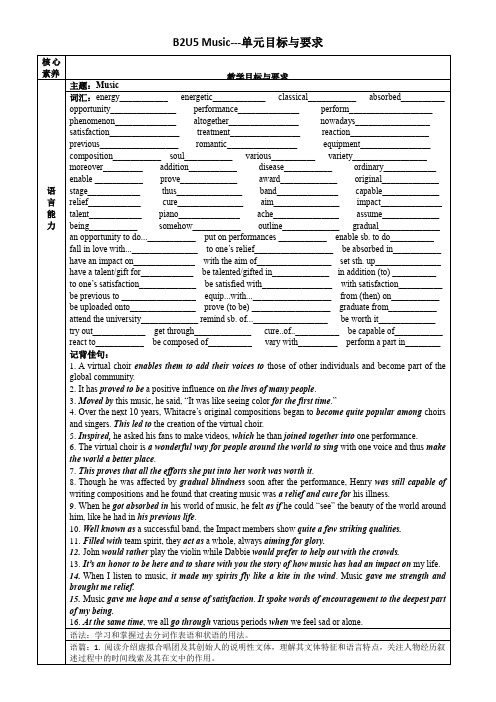
B2U5 Music---单元目标与要求语法:过去分词作表语和状语一、过去分词作表语1.过去分词可放在系动词be, get, feel, look, sound, taste, smell, remain, seem,become等之后作表语, 表示主语所处的状态。
1). He seemed quite ______________(delight) at the news.2). The door remained ____________(lock) when we arrived.2. 过去分词作表语多表示人自身的感觉、感受或事物自身的状态;现在分词作表语则多表示事物具有的特征,常译作“令人...的”。
常用的这类词有:exciting/excited; astonishing/astonished delighting/delighted moving/moved disappointing/disappointed encouraging/encouraged frightening/frightened interesting/interested3). The story they heard over the radio was very _____________(move).4). They were _____________ to hear the _______________ sound.(frighten)3. 过去分词作表语和被动语态的区别“be+过去分词”表状态时,是系表结构,此时过去分词通常已形容词化;表动作时,是被动语态,且绝大多数被动结构中的动作执行者由介词by引出。
5). 这本书写得好。
______________________________________________________________6). 这本书是鲁迅写的。
__________________________________________________________二、过去分词(短语)作状语1. 主从句主语一致,可以省略状语从句中的主语,省略的主语和动词主动关系用doing,被动关系则用done。
人教版高中英语必修2《Unit5Music》教案
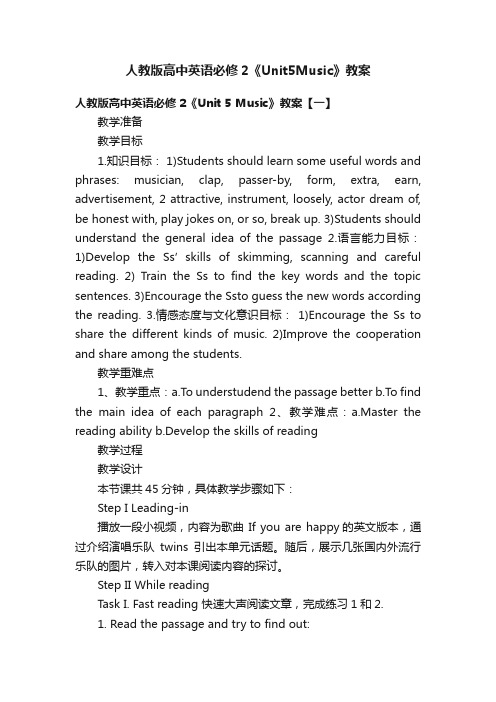
人教版高中英语必修2《Unit5Music》教案人教版高中英语必修2《Unit 5 Music》教案【一】教学准备教学目标1.知识目标: 1)Students should learn some useful words and phrases: musician, clap, passer-by, form, extra, earn, advertisement, 2 attractive, instrument, loosely, actor dream of, be honest with, play jokes on, or so, break up. 3)Students should understand the general idea of the passage2.语言能力目标:1)Develop the Ss’skills of skimming, scanning and careful reading. 2) Train the Ss to find the key words and the topic sentences. 3)Encourage the Ssto guess the new words according the reading.3.情感态度与文化意识目标:1)Encourage the Ss to share the different kinds of music. 2)Improve the cooperation and share among the students.教学重难点1、教学重点:a.To understudend the passage better b.To find the main idea of each paragraph2、教学难点:a.Master the reading ability b.Develop the skills of reading教学过程教学设计本节课共45分钟,具体教学步骤如下:Step I Leading-in播放一段小视频,内容为歌曲 If you are happy的英文版本,通过介绍演唱乐队twins引出本单元话题。
2019新人教高中英语必修二Unit5 Music整单元完整教案
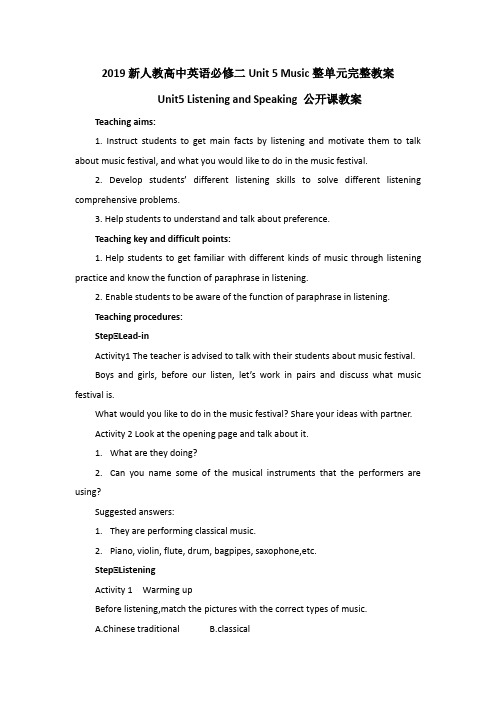
2019新人教高中英语必修二Unit 5 Music整单元完整教案Unit5 Listening and Speaking 公开课教案Teaching aims:1. Instruct students to get main facts by listening and motivate them to talk about music festival, and what you would like to do in the music festival.2. Develop students’ different listening skills to solve different listening comprehensive problems.3. Help students to understand and talk about preference.Teaching key and difficult points:1.Help students to get familiar with different kinds of music through listening practice and know the function of paraphrase in listening.2.Enable students to be aware of the function of paraphrase in listening.Teaching procedures:StepⅠLead-inActivity1 The teacher is advised to talk with their students about music festival.Boys and girls, before our listen, let’s work in pairs and discuss what music festival is.What would you like to do in the music festival? Share your ideas with partner.Activity 2 Look at the opening page and talk about it.1.What are they doing?2.Can you name some of the musical instruments that the performers are using?Suggested answers:1.They are performing classical music.2.Piano, violin, flute, drum, bagpipes, saxophone,etc.StepⅠListeningActivity 1 Warming upBefore listening,match the pictures with the correct types of music.A.Chinese traditionalB.classicalC.country musicD.hip-hopSuggested answers:1. B2.A3.C4.DActivity 2First listeningListen to the interviews and find out what kind of music the three students each like.1.The first student likes to .2.The second student likes to .3.The third student likes to .Suggested answers:1.listen to country music2.dance to hip-hop music3.play country musicActivity 3Second listeningThe reporter paraphrased some of the answers.Listen to the interviews again and complete the sentences with the words you hear.1.A:Country music touches my heart.B:So you like music that’s of ?2.A:When I listen to hip-hop,I just have to move!B:So it makes you want to ?3.A:Classical music makes me feel like I’m sitting beside a quiet stream and enjoying nature.B:So to you,it’s and ?Suggested answers:1.full of feelings2.want to dance3.peaceful and beautifulActivity 4Third listeningListen to the interviews again and think about the function of paraphrase inlistening.Suggested answers:1.to check if the listener’s understanding is correct.2.to show interest in what the speaker has said.StepⅠ SpeakingActivity 1 Enjoy some pieces of music and tell us your feelings.1.the first piece of music—played by a symphony orchestra2.the second piece of music—rock music3.the third piece of music—played by pipaSuggested answers:1.I like listening to music played by orchestras.I can hear things played oninstruments from all of the different families—woodwinds,strings,percussion and brass.Also,classical music tends to be slower,so it makes me feel calm when I listen to it.2.Rock music lets me have a strong feeling,happy or sad.3.It brings me peace and beauty,letting me feel relaxed.Activity 2 Talk in pairs.Interview each other about e the picturesbelow for ideas.These expressions may help you.Reasonsforlikingmusictouchesmyheart/soulmakesmehappy/wanttodancegivesmeenergy/hope helpsmeexercise/studysoundspeaceful/beautifulremindsmeofhome/peopleIloveExample:A:What kind of music do you like?B:I like music played by saxophone.A:What makes it so special to you?B:Because it sounds peaceful and it often reminds me of someone I love.Suggested answers:A:What kind of music do you like?B:I like Chinese folk music,for example,pipa music.A:What makes it so special to you?B:I like to listen to it when I have leisure time.It brings peace and beauty to me,which makes me feel like I’m lying by a stream in a forest.StepⅣHomework1.Tell one of your friends what kind of music you like best and why.2.Search on the Internet for more kinds of music to enjoy.Unit 5 Reading and Thinking公开课教案Teaching aims:1. To acquire the basic usage of the new words and express concerning how computers and the Internet help us experience music.2. Enable students to understand the main information and text structure of the reading text.3. Enable students to apply the reading skill of scanning to practice and understand past participle as adverbial.Teaching key points:1.Lead students to better understand how the virtual choir is formed.2.Help students identify the structure of the text and grasp and use some words and phrases to describe their music experiences.Teaching difficult points:1.Enable students to figure out the main structure of the passage.2.Get students to express their own opinions on whether a virtual choir can really bring people together.Teaching procedures:StepⅠLead-inLead students to talk about the following questions.1.How do you experience music in your daily life?2.How can computers and the Internet help us experience music differently?Suggested answers:1.I can listen to the radio, watch TV or attend concerts.puters and the Internet can help us experience a wide range of musical genres. The Internet gives us access to millions of songs in many different genres , so we can find exactly what we like. Computer technology today can also help us create the sound of an orchestra on our home computer.StepⅠPredicting for possible informationLook at the picture and the title,and then predict what the text is about.Suggested answers:The text is about some background information about the virtual choir.StepⅠ Scanning for specific informationScan the text and find out the following information.The man who came up with the idea for a virtual choir Eric Whitacre The place where he studied musical composition Juilliard School The name of his song What IfStepⅠ Intensive readingActivity 1Read Paragraph 1 and find out the key elements of virtual choir.Anyone interested in music can take part in a virtual choir.They can record themselves at any place while they perform and then upload their videos onto the Internet.They join in the virtual choir because they love it and can relax themselves.Activity 2Find out the differences between a virtual choir and a real choir.(红色部分为学生填写)Virtual choir Real choir Form video recorded livePlace on the Internet (at anyplace)stages of musicalhallsIdentity of singers anyone interested in music usually professionalsNumber of singers not limited limited to the required programmeActivity 3Read Paragraph 2 and describe Eric Whitacre’s life experience according to the timeline.Suggested answers:In 1970,he was born.In 1988,he began studying music at the University of Nevada.In 1995,he graduated from university.In 1997,he received a master’s degree in musical composition from the Juilliard School in New York.Over the next 10 years,Whitacre’s original compositions began to become quite popular among choirs and singers.Activity 4 Read Paragraph 2 again and answer the following questions.(1)What can you learn from what Whitacre said?(2)Why does the author mention Eric Whitacre’s studying experience and his achievements in music?Suggested answers:(1)It shows his experience in music which is full of surprise.(2)The author wants to stress that it was his great passion and achievements in music that led to the creation of the virtual choir.Activity 5Read Paragraph 3 and 4 and answer the following questions.(1)What gave him the inspiration to make his first virtual choir?(2)Does the writer hold a positive attitude toward the virtual choir?How do you know?Suggested answers:(1)He was inspired by a video in which a girl was singing one of his works gave him the inspiration to make his first virtual choir.(2)Yes,the writer holds a positive attitude toward the virtual choir,because he says “The virtual choir is a wonderful way for people around the world to sing with one voice and thus make the world a better place”.Activity 6Figure out the structure of the passage.Suggested answer:ThevirtualchoirStepⅠPracticeActivity 1 Complete the sentences with the correct forms of the words and phrase.st night I went to see my friend’s new rock band on at a small local music festival.2.This new pop song me of an old song that was sung by Billy White but later made popular by another singer.3.I’m so happy!My favourite singer just won a music .This that all the she put into her work was worth it.4.I with rap music when I was a teenager.Listening to it me to relax and forget about my problems.5.Five years ago,he was finally given a(n) to record his song at a(n) .Ever since,his success has shown the world that even people can become famous.6.Nowadays millions of musical performances are uploaded the Internet every day by different who may or may not be professional musicians or singers.Suggested answers:1.perform;stage2.reminds;originally3.award;proves;effort4.fell in love;enabled5.opportunity;studio;ordinary6.onto;individualsStepⅠ Creative thinkingSuggested answers:Pros:(正方)People from every corner of the world can upload their videos onto the Internet,which is like a great stage where people come together to sing.Different people sing the same song,share similar interests and values,which makes them feel like family.In the global community,people can exchange feelings and thoughts with each other like real-life communication.Cons:(反方)A virtual choir cannot have people together on stage where people can communicate in person.A virtual choir is unreal because it is just something made up.A virtual choir concert can’t have real actor-audience interaction.StepⅠ HomeworkSearch for more information about the virtual choir on the Internet.Unit 5 Discovering Useful Structures公开课教案Teaching aims:1.Get students to have a good understanding the basic usage of past wordsegmentation as past segmentation as predicative and adverbial.2. Strengthen students’ great interest in grammar learning.3. Instruct students to express their ideas with this grammar correctly.Teaching key and difficult points:1.Enable students to learn the meaning of past participles and know when to use past participles.2.How to enable students to use the structure and meaning of past word segmentation as past segmentation as predicative and adverbial.Teaching procedures:StepⅠ Lead-inLook at the pictures and describe them.The people are e.The boy is a in reading a book.The boy is s.Suggested answers:excited;absorbed;surprisedThese words serve as the predicative in the sentences.They modify the subject of the sentences like an adjective,showing the state of the subject.StepⅠ Exploring the differences between verb-ed and verb-ing as the predicativeObserve the following sentences and find out the differences between verb-ed and verb-ing as the predicative.1.The news that Man Wenjun took drugs was very surprising.2.At the news that Man Wenjun took drugs,we felt surprised.3.Your performances are satisfying.4.I am satisfied with your performances.5.The cup is broken.Suggested answer:动词-ing形式作表语时,句子主语多是物,它表示给别人造成的感觉,表示主动意义。
人教版高中英语必修第二册 《Unit 5 Music》教案
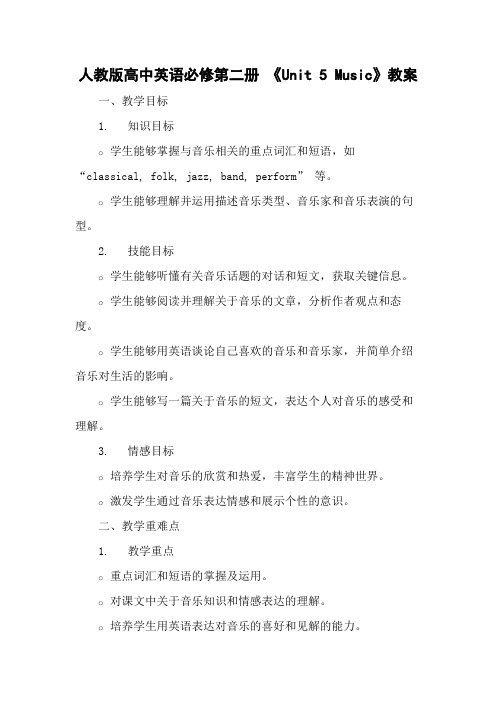
人教版高中英语必修第二册 《Unit 5 Music》教案一、教学目标1.知识目标o学生能够掌握与音乐相关的重点词汇和短语,如 “classical, folk, jazz, band, perform” 等。
o学生能够理解并运用描述音乐类型、音乐家和音乐表演的句型。
2.技能目标o学生能够听懂有关音乐话题的对话和短文,获取关键信息。
o学生能够阅读并理解关于音乐的文章,分析作者观点和态度。
o学生能够用英语谈论自己喜欢的音乐和音乐家,并简单介绍音乐对生活的影响。
o学生能够写一篇关于音乐的短文,表达个人对音乐的感受和理解。
3.情感目标o培养学生对音乐的欣赏和热爱,丰富学生的精神世界。
o激发学生通过音乐表达情感和展示个性的意识。
二、教学重难点1.教学重点o重点词汇和短语的掌握及运用。
o对课文中关于音乐知识和情感表达的理解。
o培养学生用英语表达对音乐的喜好和见解的能力。
2.教学难点o如何帮助学生准确运用丰富的词汇和句型描述音乐。
o引导学生深入理解音乐的内涵和价值。
三、教学方法1.视听教学法:通过播放音乐、视频等让学生直观感受音乐的魅力。
2.讨论交流法:组织学生讨论音乐相关话题,促进学生思维碰撞和语言表达。
3.情景创设法:创设音乐场景,让学生在情境中学习和运用语言。
四、教学过程(一)导入(5 分钟)1.播放一段不同类型的音乐片段,如古典音乐、流行音乐、摇滚音乐等。
2.提问学生:What kinds of music do you hear? How do they make you feel?(二)词汇教学(10 分钟)1.展示本单元的重点词汇和短语,结合音乐实例进行讲解。
2.开展词汇游戏,如音乐词汇猜猜猜,加强学生对词汇的记忆和理解。
(三)阅读前准备(5 分钟)1.让学生观察课文标题和图片,预测文章内容。
2.提出一些引导性问题,如:What do you think thepassage will be about music?(四)课文阅读(15 分钟)1.学生快速阅读课文,概括文章的主要内容。
高中英语必修二unit5-music-阅读教案
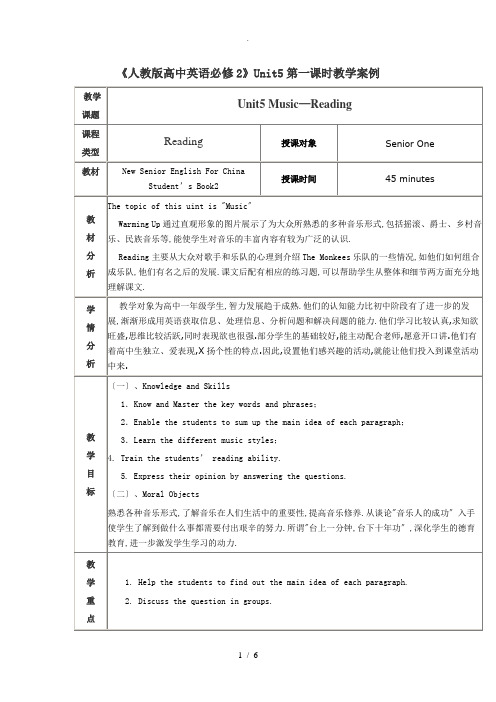
《人教版高中英语必修2》Unit5第一课时教学案例教学步骤一.Warming up——5minutes1. Attract students’ attentionPlay the song SUGAR. Talk about the "Importance of music〞with students to attract students’attention to the learning content, especially to mention the kind of music "Pop〞. Then lead students to the textbook on page34.2.Show picturesShow students some pictures about music styles and ask them to say something about theiropinions of different music.设计目的:放歌引出话题,可以吸引大家的注意力从而引导他们进入音乐这个课题,这样可以引起他们对该单元内容的兴趣并可以自然而然地引入到课文阅读.二.Pre-reading——8minutesTask one:Discussion and TalkingFour students in one group to discussionGive students some questions ask them to speak out1.Do you want to be famous?2.Please list the three steps of success.3.Do you know anything about the Monkees?设计目的:把学生分小组讨论有利于学生的合作学习能力的提高,这些问题起到过渡作用,能够顺利地进入到接下去的阅读阶段.三.While reading——20minutes。
人教版高中英语必修二Unit5 Music-Reading for Writing教案

2019新人教高中英语必修二Unit5Music-Reading for writing公开课教案Analysis of the materials:1. What- Theme: Write a speech on how music changed your life.- Thematic Context: Man and self-Main content: A speech shares a personal story about how music changed people’s life.2. WhyAuthor’s intention:to inform readers of the positive influence of music on our daily life;to inspire readers to draw energy and power from music;to draw readers’ attention to relationship between music and personal life.Value Orientation:Thematic Meaning: Exploring the power of music, live a passionate life.3. HowText type: practical writing - speechLanguage features:the language is concise and touching. By using rhetorical devices, transitional words and contrastive words, it’s not difficult for students to summarize the structure, learn its writing techniques, imitate it and apply some into practical writing.Teaching aims:1. Get students to have a good understanding of what a speech is and how to write a speech.2. Enable students to use some writing skills flexibly.3. Develop student’s writing and cooperating abilities.Teaching key and difficult points:1.Enable students to analyze the organization and language features of a speech and learn how to write a good speech.2.Enable students to write an effective speech.Teaching procedures:StepⅠWarming upPlay a video of a speech for students to watch.StepⅠReading for informationRead the speech and answer the questions.1.What was Sarah’s problem?2.How did music help her during her difficult time?3.What is her advice to others?Suggested answers:1.Sarah had a serious disease that was difficult to cure.2.It made her feel much better and helped her recover.3.Her advice to others is to use music to help when they have problems.StepⅠ Reading for structureRead the speech again and figure out the structure.Suggested answers:Part 1Greeting Introduce yourself Introduce the topicPart 2(body)Tell your story State your opinionPart 3(Closing the speech)Give your advice Summarize your speechPart 4Thank your audienceStepⅠReading for language featuresActivity 1Match the names of rhetorical devices to the lettered sentences in the speech.Metaphor______________________________Personification__________________________________Quote________________________________Repetition_________________________________rhetorical question_________________________________Simile_______________________________Suggested answers:metaphor E personification F quote Brepetition C rhetorical question A simile DActivity 2Further learn about rhetorical devices.(1):It is a question that isn’t meant to get an answer,but is asked to make a point.E.g.Have you ever faced a difficult time?(2):A thing,an idea or an animal is given human features.E.g.The city of Wuhan cries.(3):To quote is to repeat a short passage,word,phrase,or sentence that came from somewhere or someone else.E.g.As Longfellow says,“Music is the universal language of mankind.”(4):It refers to the use of the same word or phrase in a poem,a speech,etc.E.g.I came,I saw,I conquered.(5):A simile compares two things by using words such as “like” or “as”.E.g.John is as cunning as a fox.(6):Metaphor is when you use two nouns and compare them to one another.Unlike simile,you don’t use “ like” or “as” in the comparison.E.g.As a soldier,you can’t be a mouse.You have to be a tiger.Suggested answers:(1)Rhetorical question(设问)(2)Personification(拟人)(3)Quote(引用)(4)Repetition(重复)(5)Simile (明喻)(6)Metaphor(隐喻)Activity 3Read the following poem and find out the sentences that use rhetorical devices.If you want to be a...If you want to be a spy like James Bond 007,you need to be as cool as a cucumberand as sly as a foxand you need cast-iron nerves.If you want to be a model,you need to be as tall as a treeand eat like a bird.If you want to be an actorand a martial arts expert like Jackie Chan,you cannot be a weed.If you want to be successful like Bill Gates,you need to have a mind like a computerand be as sharp as a spear in business.If you want to be a magician like David Copperfield.you need to make people see that blackis white and white is black.If you want to succeed in life,you need to be as hungry as a lion.Suggested answers:Simile/repetition:You need to be as cool as a cucumber and as sly as a fox.You need to be as tall as a tree and eat like a bird.You need to have a mind like a computer and be as sharp as a spear in business.You need to be as hungry as a lion.Metaphor:You cannot be a weedStepⅠPreparing for writingWork in groups.Think of ways that people experience music and how music can help people.(红色部分为学生作答)Ways people experience music How music can help peoplesinging(in a choir)•give encouragement •provide joy •express emotions ...listening to a piece of music or a song •share similar feelings •bring about happiness •make listeners strong in mind ...playing the piano/guitar/guqin...•express feelings from heart •imagine a dream world •have fun...StepⅠ Writing a speechActivity 1Complete the outline and use it along with rhetorical devices to draft your speech.•Introduce yourself.•Write about how music made you/him/her feel.•Give the topic of your speech.•Relate your/his/her experience to the audience.•Write about your experience with music,or the experience of someone you know.•Close the speech.Hello, my name is,and I’m here to talkabout .years ago,__________________________________________________________________ Suggested answer:Answers may vary.This is one of the versions.Hello,my name is Jane,and I’m here to talk about how music influenced my father’s life.Have you ever encountered a time when everything went wrong and you were discouraged?Five years ago,my father was diagnosed to develop a serious disease,which was hard to cure.It seemed as if the world was at an end.The doctor suggested that we should keep calm and help my father fight with the disease bravely.He also advised my father to listen to music often.Just as Walter Haddon once said,“Music is the medicine of a troubled mind.” My father followed the doctor’s advice and listened to soft music from time to time.Music gave my father encouragement,music gave my father strength and music gave my father confidence.Music became my father’s best friend,helping him get through the hardest time.I do hope none of you have to meet with tough times in your life.In case you come across the same situation,I advise you to turn to music,for it does help.Thank you for listening.Activity 2Exchange drafts with your e the checklist to help you revise the draft.√Does the writer explain how music has changed his/her/someone else’s life?√Are some of the rhetorical devices included and used properly?√Does the writer talk about how music makes him/her/someone feel?√Is the first word in each sentence capitalized?√Does the writer use correct punctuation?StepⅠ HomeworkRequired: Polish your speech writing according to the suggestions given by your partners.Optional:1. Select one piece of music as the BGM of your speech.2. Practice your speech skills for a better performance.教学反思:本节课总体上实现了教学目标,学生都能有很完整的演讲习作生成,并能将本课难点修辞手法攻克。
高中英语必修二Unit5_Music教案

Unit5 Music [教学目标]:一、知识与技能一、知识与技能1、掌握话题语言的运用、就熟悉的音乐话题表达看法;2、了解各种各样的音乐形式,深化对音乐的认识;3、学会从一般文字资料中获取主要信息、思考话题背后的更深层次的内容,学会深入发掘和探讨。
会深入发掘和探讨。
二、过程与方法二、过程与方法1、听音乐,感受音乐风格;、听音乐,感受音乐风格;2、分组讨论、合作练习;、分组讨论、合作练习;3、结合所知,分类整理与归纳。
、结合所知,分类整理与归纳。
三、情感态度与价值观三、情感态度与价值观1、增添音乐欣赏趣味,提高音乐修养;2、懂得在日常交流中与他人分享各种学习资源、理解并尊重他人;3、培养合作精神和积极乐观的人生态度。
[教学重点]:1、掌握有关音乐的单词、熟练运用课文中所出现的重要词汇与短语2、学习由介词+which/whom引导的定语从句引导的定语从句3、进一步熟悉有关建议与偏好的表达方式[教具准备]:多媒体、音乐文件多媒体、音乐文件[课时分配]:1课时课时[教学过程]:Period 1 Warming up and reading Warming up “Keep Your Head Up”(抬起你的头),What would you like to do if you are free today? Task 1: Can you name any music style? Task 2: Do you know any famous bands in the world? Task 3: Skimming reading Read the passage quickly and match the general meaning of each paragraph. Main idea of each paragraph Paragraph 1: Dreaming of being a famous musician or singer. Paragraph 2: How the Monkees became serious about their business. Paragraph 3: How musicians form bands. Paragraph 4 How the band got their start. Scanning reading Para.2 How do people get to form a band? Members High school _________. Reasons They like to_________ and ________music. Places They _________their music in someone’s house. Forms They They may may play to_________ in the street or subway, and and give give give ______________ ______________ ______________ in in in pubs pubs pubs or or clubs. Results They can __________ some _____________ money. They hope to make records in a _____________and become________________. Para.3&4 Information about The Monkees. Began as _____________________ music & jokes based on ________________ after a year or so became serious in about 1970 ________________________ in the mid1980s ________________________ in 1996 a real band True or false 1. The writer believes that lots of people attach great importance to becoming rich and famous . 2. Some bands in American must start as a group of high school students. 3. It was" The Beatles" that started in a different way. 4. It was hard for the TV organizers to look for good rock musicians. 5. At first," The Monkees" didn't play their own songs. Summary If If we we we are are are __________ __________ __________ _________ _________ _________ ourselves, ourselves, ourselves, most most most of of of us us us have have have _________ _________ _________ _______ _______ being being famous sometimes in famous sometimes in our lives. Most musicians often meet and _________ a band. Sometimes they play in the street to ________________ so that they can earn some money and this also gives them a ___________ to realize their dreams. There was once a band started in a different way. The musicians of whom the band was was formed___________ formed___________ _____________ _______each _______each other other other as as as well well well as as as played played music, whose music and jokes were loosely __________ ___________ “The Beatles”. Their exciting performances were copied by other groups.“The Monkees” played their own instruments and wrote their own mu sic. Though it ____________ _________ in in 1970, 1970, 1970, it it it reunited reunited reunited in in in the the the mid-1980s mid-1980s mid-1980s and and and it it it is is is still still popular today. Task 4: Press conference 1. What kind of music do you like? Why 2. Which singer do you like best and why? 3. How does music make you feel? 4. How did your band start? 5. What are the differences between your band and others ? 6. Why did you change to sing your own songs? 7. What’s your future plan?Sample dialogue Journalist A Monkees MemberB A. What kind of music do you like, pop musi c or …?B. I like…, because…A. Who is your favorite singer? B. Well, I prefer /like… Why ? Her/his music makes me feel…A. How did your band start? B. We start as……What are the differences between your band and others ? We often play jo k es on …….kes on …….A. Why did you change to sing your own songs? B. Because…….A. What’s your future plan?B .We want to…….A. Thanks for your coming. B. You are welcome……Task 5: What do you think of “the Monkees”?Discuss in pairs using the adjectives that you think best describe them. 让学生进行重点词汇、让学生进行重点词汇、词组和句型的对话练习,词组和句型的对话练习,词组和句型的对话练习,时间允许的话我也会提问,时间允许的话我也会提问,时间允许的话我也会提问,使学使学生在真实的语言环境中自然地习得新的语言知识,进一步熟悉有关建议与偏好的表达方式。
人教版高中必修二unit5Music教案
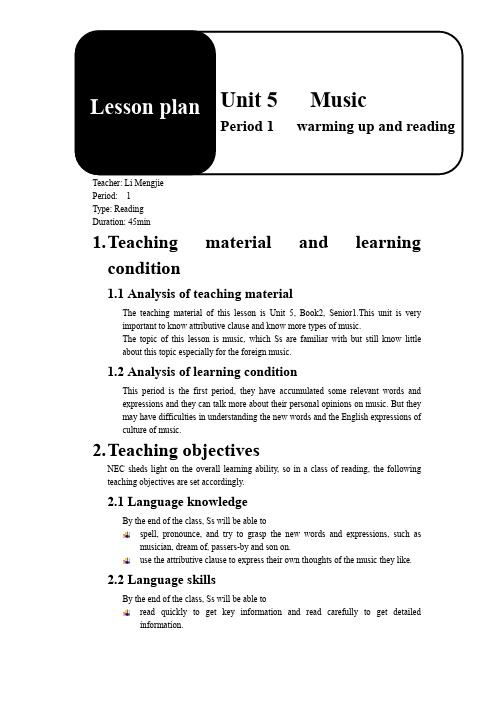
Teacher: Li Mengjie Period: 1 Type: Reading Duration: 45min1. T eaching material and learningcondition1.1 Analysis of teaching materialThe teaching material of this lesson is Unit 5, Book2, Senior1.This unit is very important to know attributive clause and know more types of music.The topic of this lesson is music, which Ss are familiar with but still know little about this topic especially for the foreign music.1.2 Analysis of learning conditionThis period is the first period, they have accumulated some relevant words and expressions and they can talk more about their personal opinions on music. But they may have difficulties in understanding the new words and the English expressions of culture of music.2. T eaching objectivesNEC sheds light on the overall learning ability, so in a class of reading, the followingteaching objectives are set accordingly.2.1 Language knowledgeBy the end of the class, Ss will be able tospell, pronounce, and try to grasp the new words and expressions, such as musician, dream of, passers-by and son on.use the attributive clause to express their own thoughts of the music they like.2.2 Language skillsBy the end of the class, Ss will be able toread quickly to get key information and read carefully to get detailed information.communicate with others in English to express their own ideas about music.Understand the whole passage and know how to give summary to the passage.2.3Affectsimprove their music accomplishment.2.4Culture awarenessBy the end of the class, Ss will be able toimprove their ability to appreciate different kinds of music.know more about foreign music and feel different kinds of culture.2.5Learning strategiesBy the end of the class, Ss will be able tocultivate their individual learning and cooperative learning.3.L anguage focuses and anticipated difficulties3.1Analysis of language focusesIn class, it is important for Ss toknow some new words about music and have proficiency on the vocabularyappeared in the text.learn the usage of the attributive clause.【Solution】T should use CLT to guide Ss to use the target language and explain the new knowledge carefully.3.2Analysis of anticipated difficultiesSs may have difficulties inusing the attributive clause to express their ideas correctly..giving brief summary to the passage.4. Teaching methodBased on the understanding of reading as an interactive process, teaching reading in the classroom is divided into three stages in which the top-down and bottom-up techniques integrated to develop the students language efficiency in general and reading strategies. The three stages are pre-reading, while-reading and post-reading.5. Teaching procedures (45min)6. Blackboard design。
2019统编人教版高中英语必修第二册unit 5《Music》全单元教案教学设计
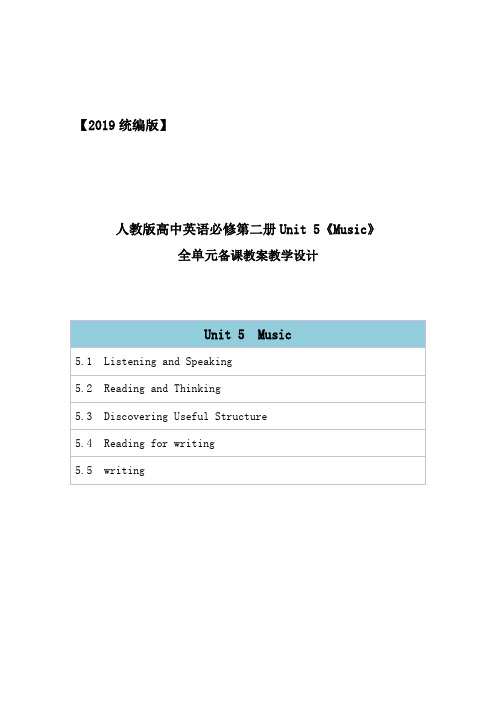
【2019统编版】人教版高中英语必修第二册Unit 5《Music》全单元备课教案教学设计Unit 5 MusicListening and Speaking【教学目标】1. Instruct students to get main facts by listening and motivate them to talk about the topics about music, the types of music, and how the music makes them feel.2. Develop students’ sense of cooperative learning and individual thinking capability.3. Develop students’ different listening skills to solve different listening comprehensive problems.4. Help students to understand how to use the structures “past participle as adverbial”.【教学重难点】Prompt students to talk about the related topics, such as types of music they know, their favourite type of music, how music makes them feel, and how to use past participle as adverbial.【教学过程】Step 1 Lead inThe teacher is advised to talk with their students about music.Boys and girls, before we listen, let’s work in pairs and discuss what type of music you know.Which type is your favorite? How does it make you feel? Share your ideas with partners.I know Chinese traditional music/classical music/country music/hip-hop/jazz/pop music/Latin music/rap/rock/punk…I like classical music. It makes me feel full of energy and happy.Step 2: PredictionAfter their small talk, the teacher can move on by finishing the following task: See the pictures and give the correct answers.1. What are the people doing in the picture below?2. Match the pictures with the correct types of music.A. Chinese traditionalB. classicalC. country musicD. hip-hop1_______________2_______________3_______________4_______________Step 3: Summary of the main ideaListeningI. Play the radio about The Sound of Music (音乐之声), and let students finish the following tasks.A star has come out to tell me1.___________________ to goBut deep in the dark-green shadowsAre voices that urge me to staySo I pause and I wait and I listenFor one more sound for one more lovely thing2.___________________ might say…The hills are alive with the sound of musicWith songs they have sung 3.__________________The hills fill my heart with the sound of musicMy heart 4.__________________ every song it hearsMy heart wants to beat like the wings of the birds that rise from the lake to the treesMy heart wants to sigh like the chime that flies from a church on a breezeTo laugh like a brook 5.__________________ and falls over stones in its wayTo sing through the night like a lark who is 6._____________I go to the hills when my heart is lonelyI know I will hear what I’ve heard beforeMy heart will 7.______________ the sound of musicAnd I’ll sing once moreII. The reporter paraphrased some of the answers the students gave him. Listen to the interviews again and complete the sentences with the words you hear.1. A: Country music touches my heart.B: So you like music that’s _______of _______?2. A: When I listen to hip-hop, I just have to move!B: So it makes you want to _______?3. A: Classical music makes me feel like I’m sitting beside a quiet stream and enjoying nature.B: So to you, it’s _______ and _______?Learning new wordsList the new words in the lesson, tell students the meaning of these words and give some examples.News words: classical, energy, soul…Talking projectGuide students to do speaking practice.I. Talk in pairs. Interview each other about music. Use the picture below for ideas.A: What kind of music do you like?B: I like techno music.A: What makes it so special to you?B: I like to listen to it when l exercise. It gives me energy.II. Work in pairs or groups and role play a conversation.●Suppose you are a reporter and interviewing the students who about music.➢I like to…➢Chinese traditional song/classical music/hip-hop music/country music…➢Listen to/play/sing…Unit 5 MusicReading and Thinking【教学目标】1. To acquire the basic usage of the new words and express concerning how computers and the Internet help us experience music.2. Enable students to understand the main information and text structure of the reading text.3. Enable students to understand past participle as adverbial.【教学重难点】1. Guide students to pay attention to reading strategies, such as prediction, self-questioning and scanning.2. To talk about the advantages and disadvantages of being a member of virtual choir.3. Lead students to understand past participle as adverbial;【教学过程】Step 1 PredictionAsk students the question.How can computers and the Internet help us experience music differently?Step 2: Learning new wordsLearn words:perform,enable,prove,award,and fall in love with…New words practiceIn order to have a good _______________ (perform), I have made good preparations for it.At present, developing the ___________ (able) of the students is an important task in our daily teaching activity.Step 3: Learning sentence patternsIntroduce the sentence patterns in the lesson and give some examples and explanation1. as 引导定语从句,意为“正如,正像”2. 过去分词(短语)作状语as引导定语从句的常用句式有:as is known to all 众所周知as we all know我们都知道as we can see正如我们所看到的as is reported正如报道的as is often the case这是常有的事as is mentioned above如上所述Step 4: Fast reading tasksGuide student to read the article quickly, teach some reading skills and do some exercises.Task of the first fast reading:Read quickly and figure out the key words of each paragraph.•Paragraph 1: enable•Paragraph 2: award•Paragraph 3: performanceTask of the second fast reading:1. What is mainly discussed in this passage?2. Which paragraph mentions background information about the virtual choir?3. Which paragraph mentions the conclusion of the virtual choir?Step 5: Careful reading tasksGuide student to read the article carefully and do some exercises.1. What is the attitude towards the virtual choir?2. Why does the virtual choir prove to be a good influence on the lives of many people?3. If you want to take part in a virtual choir, you need….Step 6: Study reading tasksAnalyze two difficult sentences in the text.1. Imagine having the opportunity to sing together with hundreds of other people while you are at home alone.2. A virtual choir enables them to add their voices to those of other individuals and become part of the global community.Step 7 Homework:Review what we have learned and find out the key language points in the text.Unit 5 MusicDiscovering Useful Structure【教学目标】1. Get students to have a good understanding the basic usage of past word segmentation as past segmentation as predicative and adverbial.2. Strengthen students’ great interest in grammar learning.3. Instruct students to express their ideas with this grammar correctly.【教学重难点】How to enable students to use the structure and meaning of past word segmentation as past segmentation as predicative and adverbial.【教学过程】Step 1 Lead-inGive some messages and ask students to guess who she is.英语过去分词的句子。
高中英语:Unit 5《Music》教案-Reading 新人教版必修2
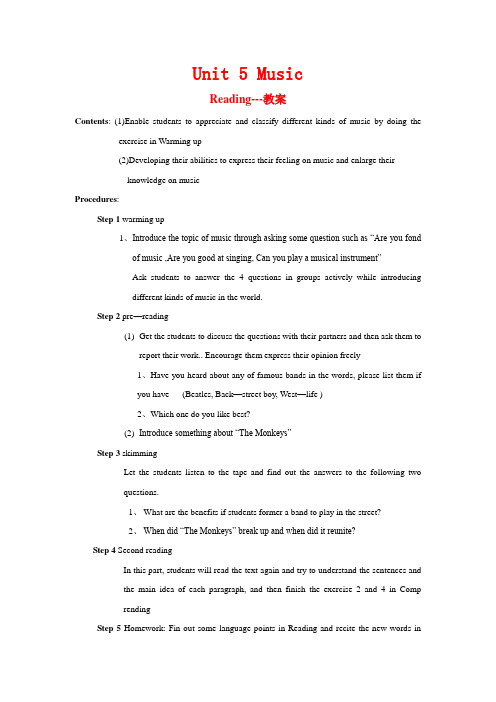
Unit 5 MusicReading---教案Contents: (1)Enable students to appreciate and classify different kinds of music by doing the exercise in Warming up(2)Developing their abilities to express their feeling on music and enlarge theirknowledge on musicProcedures:Step 1 warming up1、Introduce the topic of music through asking some question such as “Are you fondof music ,Are you good at singing, Can you play a musical instrument”Ask students to answer the 4 questions in groups actively while introducingdifferent kinds of music in the world.Step 2 pre—reading(1)Get the students to discuss the questions with their partners and then ask them toreport their work.. Encourage them express their opinion freely1、Have you heard about any of famous bands in the words, please list them ifyou have (Beatles, Back—street boy, West—life )2、Which one do you like best?(2)Introduce something about “The Monkeys”Step 3 skimmingLet the students listen to the tape and find out the answers to the following twoquestions.1、What are the benefits if students former a band to play in the street?2、When did “The Monkeys” break up and when did it reunite?Step 4 Second readingIn this part, students will read the text again and try to understand the sentences andthe main idea of each paragraph, and then finish the exercise 2 and 4 in ComprendingStep 5 Homework: Fin out some language points in Reading and recite the new words inunit 5 Step 6:Feedback。
- 1、下载文档前请自行甄别文档内容的完整性,平台不提供额外的编辑、内容补充、找答案等附加服务。
- 2、"仅部分预览"的文档,不可在线预览部分如存在完整性等问题,可反馈申请退款(可完整预览的文档不适用该条件!)。
- 3、如文档侵犯您的权益,请联系客服反馈,我们会尽快为您处理(人工客服工作时间:9:00-18:30)。
《人教版高中英语必修2》Unit5第一课时教学案例
教学步骤一.Warming up——5minutes
1. Attract students’ attention
Play the song SUGAR. Talk about the “Importance of music”with students to attract students’attention to the learning content, especially to mention the kind of music “Pop ”. Then lead students to the textbook on page34.
2.Show pictures
Show students some pictures about music styles and ask them to say something about their
opinions of different music.
设计目的:放歌引出话题,可以吸引大家的注意力从而引导他们进入音乐这个课题,这样可以引起他们对该单元内容的兴趣并可以自然而然地引入到课文阅读。
二.Pre-reading——8minutes
Task one:Discussion and Talking
Four students in one group to discussion
Give students some questions ask them to speak out
1.Do you want to be famous?
2.Please list the three steps of success.
3.Do you know anything about the Monkees?
设计目的:把学生分小组讨论有利于学生的合作学习能力的提高,这些问题起到过渡作用,能够顺利地进入到接下去的阅读阶段。
三.。
